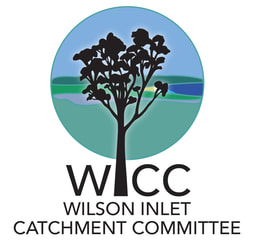Invisible helpers in our soil:
discovering microbes with impacts on soil health
discovering microbes with impacts on soil health
A healthy community of soil microbes can improve the drought resistance, disease resistance and nutrient use of agricultural soils. Local farmers are using microbial soil testing to gain insight into the invisible micro-organisms that are present in their soil, with big effects on soil health, productivity and profitability. Wilson Inlet Growers Group met in April to discuss soil biology with Dr Ash Martin from Microbiology Laboratories Australia. Microbe testing will be available to all members of the Growers Group, with soil sampling carried out in spring when the activity of microbes is at its highest.
Most microscopic organisms live in the root zone. They have a big effect on how plants absorb nutrients. Generally, microbes prefer higher plant diversity and lower chemical use. “Above-ground diversity results in below-ground diversity” says Dr Martin – a broad range of plant species is good for soil biology and microbes.
Applying herbicides and fertilisers can reduce the number of microbes in the soil, but they will re-colonise over time. There are also products available to inoculate the soil with microbes, helping them to become re-established.
As microbial communities are so varied, maintaining a high diversity of microbes means that soils can recover quickly if one type of microbe declines temporarily due to farming practices. Some practices can have mixed results for micro-organisms depending on the scenario. For example, tillage in compacted, degraded soil may benefit soil microbes by increasing aeration, while in healthy soils which already have a good structure repeated tillage can be harmful to soil microbe communities.
Soil health is influenced by many soil properties – physical, chemical and biological. Soil biology includes all things living in the soil – both plants, animals, things you can see and microscopic. Each soil property is in turn influenced by four soil processes – residue digestion, nutrient cycling, soil structure maintenance and pest and disease regulation. “The living part of the soil is driving the four soil processes,” says Dr Ash Martin.
WIGG is funded in part by the Western Australian Government’s State Natural Resource Management Program.
Most microscopic organisms live in the root zone. They have a big effect on how plants absorb nutrients. Generally, microbes prefer higher plant diversity and lower chemical use. “Above-ground diversity results in below-ground diversity” says Dr Martin – a broad range of plant species is good for soil biology and microbes.
Applying herbicides and fertilisers can reduce the number of microbes in the soil, but they will re-colonise over time. There are also products available to inoculate the soil with microbes, helping them to become re-established.
As microbial communities are so varied, maintaining a high diversity of microbes means that soils can recover quickly if one type of microbe declines temporarily due to farming practices. Some practices can have mixed results for micro-organisms depending on the scenario. For example, tillage in compacted, degraded soil may benefit soil microbes by increasing aeration, while in healthy soils which already have a good structure repeated tillage can be harmful to soil microbe communities.
Soil health is influenced by many soil properties – physical, chemical and biological. Soil biology includes all things living in the soil – both plants, animals, things you can see and microscopic. Each soil property is in turn influenced by four soil processes – residue digestion, nutrient cycling, soil structure maintenance and pest and disease regulation. “The living part of the soil is driving the four soil processes,” says Dr Ash Martin.
WIGG is funded in part by the Western Australian Government’s State Natural Resource Management Program.
